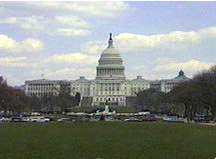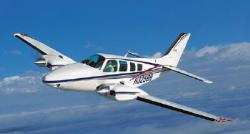Good Samaritans Breathe Easier
 The United States House of
Representatives has overwhelmingly (385-12) passed HR 1084, a bill
backed by EAA Tuesday that would extend "Good Samaritan"
protections to nonprofit volunteer pilot organizations and
volunteer pilots. The Volunteer Pilot Organization Protection Act
of 2004 ensures that vital services, such as donated medical
flights for the needy, flights of compassion, humanitarian, and
charitable purposes. Charitable organizations conduct more than
30,000 such flights annually.
The United States House of
Representatives has overwhelmingly (385-12) passed HR 1084, a bill
backed by EAA Tuesday that would extend "Good Samaritan"
protections to nonprofit volunteer pilot organizations and
volunteer pilots. The Volunteer Pilot Organization Protection Act
of 2004 ensures that vital services, such as donated medical
flights for the needy, flights of compassion, humanitarian, and
charitable purposes. Charitable organizations conduct more than
30,000 such flights annually.
Rol Murrow, member of the Emergency Volunteer Air Corps and
Chairman/CEO of the Air Care Alliance, says that the voting margin
is encouraging. "The Air Care Alliance is extremely pleased that
the bill has passed the House and especially by such a wide
margin," Murrow said. "Our hope is that the Senate will follow
through very quickly before the session ends to make this
protection available as quickly as possible."
The Senate version, S-955, is sponsored by George Allen (R-VA)
and co-sponsored by Saxby Chambliss (R-GA); James Inhofe, (R-OK);
Mary Landrieu (D-LA); and James Talent (R-MO).
 "We are calling on the entire
aviation community to contact their Senators and the appropriate
committee members and tell them how important the legislation is,"
Murrow urged. "Whether it moves or not and how fast it moves will
depend entirely on whether or not legislators hear about the need."
EAA has pledged its support to help move the bill forward through
the Senate, and asks members to contact their US Senators to urge
their swift approval of the bill. According to the Senate website,
the body has targeted October 1, 2004, for adjournment.
"We are calling on the entire
aviation community to contact their Senators and the appropriate
committee members and tell them how important the legislation is,"
Murrow urged. "Whether it moves or not and how fast it moves will
depend entirely on whether or not legislators hear about the need."
EAA has pledged its support to help move the bill forward through
the Senate, and asks members to contact their US Senators to urge
their swift approval of the bill. According to the Senate website,
the body has targeted October 1, 2004, for adjournment.
It is difficult, if not impossible, for a non-profit volunteer
pilot organization to get aviation insurance that actually covers
aviation operations. Theoretically, the insurance shouldn't be
needed since the groups are not operating aircraft; they act as
go-betweens between a person needing help or a community needing
service and volunteer pilots who wish to provide that service. The
operator of the aircraft traditionally is responsible for the
insurance.
However that has not stopped some of the volunteer groups from
being named in legal actions when something has occurred, and
regardless of whether the case has merit or not, the groups end up
having to defend themselves, which can be a very expensive
proposition. This new legislation will relieve the organizations
from having to secure coverage for the aircraft operations.
Provisions of the legislation also relieve an organization's
volunteer directors, officers and fight coordinators of liability
in the event something should occur.
 This legislation also protects the
volunteer pilots because it makes them liable only up to the level
of their insurance. Pilots generally are required by the groups to
carry insurance and the flights in almost all cases are legally
part 91 flights.
This legislation also protects the
volunteer pilots because it makes them liable only up to the level
of their insurance. Pilots generally are required by the groups to
carry insurance and the flights in almost all cases are legally
part 91 flights.
Volunteer pilots provide a range of services for free by paying
their own expenses for the plane. More than 50 different
organizations provide services ranging from medical transport for
ambulatory patients to transport of blood and organs; travel for
organ donor recipients who need to get to a medical facility
promptly; post-disaster relief for municipalities; and
environmental flights.
"At this point it should be a non-controversial bill that
basically brings volunteer pilots and the volunteers who support
them through the various public benefit flying groups under the
protection of the Volunteer Protection Act of 1997," Morrow
added.
 ANN's Daily Aero-Term (04.26.24): DETRESFA (Distress Phrase)
ANN's Daily Aero-Term (04.26.24): DETRESFA (Distress Phrase) ANN's Daily Aero-Linx (04.26.24)
ANN's Daily Aero-Linx (04.26.24) Airborne 04.22.24: Rotor X Worsens, Airport Fees 4 FNB?, USMC Drone Pilot
Airborne 04.22.24: Rotor X Worsens, Airport Fees 4 FNB?, USMC Drone Pilot Airborne 04.24.24: INTEGRAL E, Elixir USA, M700 RVSM
Airborne 04.24.24: INTEGRAL E, Elixir USA, M700 RVSM Airborne-NextGen 04.23.24: UAVOS UVH 170, magni650 Engine, World eVTOL Directory
Airborne-NextGen 04.23.24: UAVOS UVH 170, magni650 Engine, World eVTOL Directory





